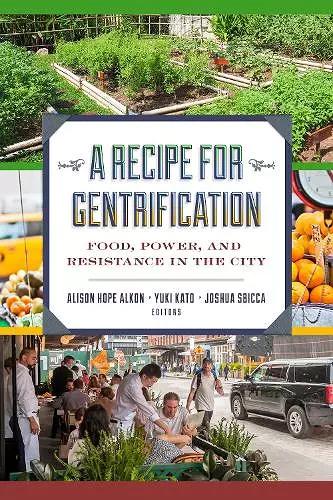A Recipe for Gentrification
Food, Power, and Resistance in the City
Alison Hope Alkon editor Yuki Kato editor Joshua Sbicca editor
Format:Paperback
Publisher:New York University Press
Published:21st Jul '20
Should be back in stock very soon

Honorable Mention, 2021 Edited Collection Book Award, given by the Association for the Study of Food and Society
How gentrification uproots the urban food landscape, and what activists are doing to resist it
From hipster coffee shops to upscale restaurants, a bustling local food scene is perhaps the most commonly recognized harbinger of gentrification. A Recipe for Gentrification explores this widespread phenomenon, showing the ways in which food and gentrification are deeply—and, at times, controversially—intertwined.
Contributors provide an inside look at gentrification in different cities, from major hubs like New York and Los Angeles to smaller cities like Cleveland and Durham. They examine a wide range of food enterprises—including grocery stores, restaurants, community gardens, and farmers’ markets—to provide up-to-date perspectives on why gentrification takes place, and how communities use food to push back against displacement.
Ultimately, they unpack the consequences for vulnerable people and neighborhoods. A Recipe for Gentrification highlights how the everyday practices of growing, purchasing and eating food reflect the rapid—and contentious—changes taking place in American cities in the twenty-first century.
The authors in this collection not only make a significant contribution to food studies but also create an important and much needed place for food within the scholarship on urban planning and gentrification ... This book should be on the shelves of every trendy coffee shop or bookstore in the neighborhoods examined in this volume, or anywhere in the country that people gather in places made possible at great expense to others because of what gentrification has wrought. * Food, Culture, and Society *
This book cleverly weaves together a wide range of ways in which food intersects with gentrification, while the complex issues explored are made accessible to a broad audience. A Recipe for Gentrification will be of interest to food justice scholars and activists; urban researchers and planners; as well as community organizers, small business owners, and allies who seek to deepen their understanding of their own implications in processes of gentrification and social justice. * The AAG Review of Books *
The book remains an exciting and tangible exploration of the topics of social justice, urban agriculture, community capacity building, and the right to the city. It can be recommended as an equally engaging entry point for any one of them. * Journal of Cultural Economy *
In a short time, food—what we consume and how we consume it, how it's made, where it comes from and how it gets transported—has gone from a frivolous topic for social science research to a significant one. Urban scholars have been paying attention. By looking at actual city spaces, this volume tackles the important issue of the link between food and where we live. Specifically, these chapters address how the ways that food gets made, purchased, and eaten are intertwined with processes of gentrification, giving us a new lens for understanding this complicated form of urban change. Displacement, inequality, community conflict, development policy, and resistance, among many other critical issues, receive insightful analyses from researchers studying an array of food-related activities in several North American cities. Food's implications in and for gentrification is a focus whose time has come, and luckily we now have this volume to start the conversation. -- Richard E. Ocejo, author of Masters of Craft: Old Jobs in the New Urban Economy
These valuable studies show how food has become the cultural frontier of urban change. From urban farms to farmers’ markets, interactions between food and place empower gentrification but also enable resistance to it. Alerting us to the slippery slope from appropriation to dispossession, the authors make the crucial point that the city’s authenticity depends on diversity more than on good taste. -- Sharon Zukin, author, Naked City: The Death and Life of Authentic Urban Places
This edited volume, focused on the interplay of food, place, and urban gentrification, offers an extensive mix of rich sociological and food-activist discourse that could potentially spark lively discussion in both urban studies and urban planning courses. * CHOICE *
The methodological approaches, grounded primarily in ethnography, center people directly impacted by unjust policies and extractive approaches to development…The contributors pushed me to think about the role of scholars in these uneven food systems and gentrification processes, both structurally and culturally. * Gastronomica *
A Recipe for Gentrification should be foundational reading for any sociology or food studies scholar and anyone pursuing a career in urban development or real estate.The collection should also be required reading for anyone interested in urban agriculture or community gardens professionally or as a volunteer. * Journal of Agriculture, Food Systems, and Community Development *
ISBN: 9781479811373
Dimensions: unknown
Weight: unknown
384 pages